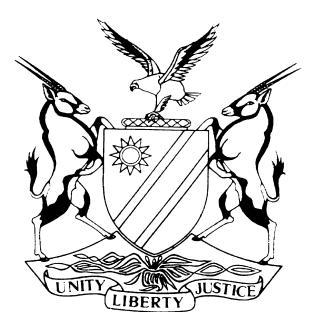R NOT REPORTABLE

HIGH COURT OF NAMIBIA MAIN DIVISION, WINDHOEK
JUDGMENT
Case No: CR 35/2013
In the matter between:
THE STATE
and
JOHN DIRE KANGONDJO
Neutral citation: The State v Kangondjo (CR 35/2012) [2013] NAHCMD 153 (7 June 2013)
Coram: HOFF, J and UNENGU, AJ
Delivered on: 7 June 2013
Flynote: Criminal Procedure – Sentence – Accused sentenced to pay a fine with an alternative period of imprisonment – suspended on condition accused renders service to community – sentence incomplete
Summary: The accused convicted of theft was sentenced to pay a fine of N$1000.00 or 6 months imprisonment wholly suspended on condition accused renders community service in terms of section 297(1)(b) read with subsection 1(a)(i)(cc) of the Criminal Procedure Act 51 of 1977 – Sentence incomplete and set aside on review.

ORDER

Therefore, and for the aforegoing reasons I make the following order:
(i) The conviction is in order and is confirmed.
(ii) The sentence imposed by the magistrate is set aside and the matter is remitted to the magistrate to sentence the accused afresh, taking into account guidelines contained in the matter of S v Rabie above.

REVIEW JUDGMENT

UNENGU, AJ (HOFF, J concurring):
[1] This matter comes before me for automatic review. The accused who was not legally represented, was charged with and convicted of theft and sentenced as follows: ‘Accused fined N$1000.00 or six months imprisonment wholly suspended on condition accused does 100 hours community service supervised by Superintended Kauta, effective today’.
[2] I directed a query to the magistrate concerned to provide any reason why he had omitted a period of suspension from the sentence. The magistrate replied as follows:
‘a. The rationale behind the sentence was to invoke community service as the sole condition for the suspension;
b. I was entirely unaware that in situations like this, the period of suspension should nonetheless be stipulated the reason being that should the accused person default on community service the fine or in default imprisonment immediately becomes of effect;
c. The learned Judge may, however, provide guidance on whether or not all suspended sentences ought to encompass a period of suspension.’
[3] Section 297(1), of the Criminal Procedure Act1 provides that where a court convicts a person of any offence in respect of which law prescribes a minimum punishment, the court may in its discretion –
(a) ……
(b) pass sentence but order the operation of the whole or any part thereof to be suspended for a period not exceeding five years on any condition referred to in paragraph (a)(i) which the court may specify in the order; or
(c) ……
[4] One such condition referred to in paragraph (a)(i)(cc) of section 297(1) of the CPA, is the rendering of some service for the benefit of the community. This is the order specified by the magistrate in his sentence as a condition for the suspension of the sentence imposed, therefore, as the learned magistrate chose to suspended the sentence following the provisions of subsection 1(b) read with subsection 1(a)(i)(cc) of the CPA, the period for which the sentence has been suspended must be included to limit the time frame within which the accused should render his service to the community. Without such a time limit stipulated, the suspended sentence will pose no threat to the accused with regard implication of a failure of performing the service timeously, because the accused has an indefinite period within which to complete his sentence. Such a sentence, therefore, in my view, would be ineffective.
[5] There is still another defect in the order made by the magistrate and that is that the order lacks particularity and is ambiguous in that it does not state the place where the service will be rendered; it does not specify the service – to be rendered and during which time of the day the service must be rendered. Further, the accused and the person to supervise him do not know how many hours the accused should work per shift – which hours the supervisor should maintain every time the accused reports for service.
[6] The order in its present form does not address the issues elaborated in paragraph 5 above as to when, where, how and the type of service the accused person is supposed to render to the community. See S v Rabie2 for an example of how a community service order is formulated and made. In the Rabie matter above, a medical doctor who was found guilty of dealing in rough and uncut diamonds was punished with a fine with an alternative of a period of imprisonment and in addition to that, ordered to render community service at the Katutura State Hospital’s Casualty section for a period of two years after hours and during weekends – public holidays included, without remuneration.
[7] Therefore, and for the aforegoing reasons I make the following order:
(i) The conviction is in order and is confirmed.
(ii) The sentence imposed by the magistrate is set aside and the matter is remitted to the magistrate to sentence the accused afresh, taking into account guidelines contained in the matter of S v Rabie above.
_____________________
EP Unengu
Acting Judge
_____________________
EPB Hoff
Judge
1Act 51 of 1977 (The CPA)
21990 (1) SACR 616 (SWA)
Documents citing this one 2
Judgment 2
| 1. | S v Engelbrecht (CR 28/2024) [2024] NAHCMD 176 (17 April 2024) | |
| 2. | S v Lipuleni and Others (CR 22 of 2022) [2022] NAHCNLD 47 (26 April 2022) |